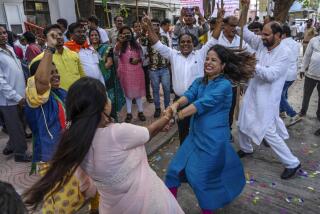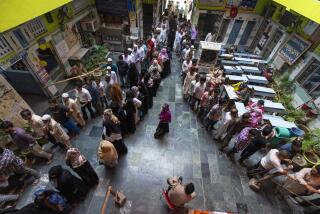Low Turnout Marks Voting in Nepal
- Share via
KATMANDU, Nepal — They say that after a country opts for democracy, what counts is not the first election but the second.
Nepalese got their second chance Tuesday, and after months of political acrimony, charges of official sleaze and a lackluster, violence-marred campaign, about half showed how they felt by staying home.
Others in this poor and rugged Himalayan land cast ballots for the opposition Communists, or for the people whose reign by royal fiat was replaced by multi-party democracy four years ago.
A manifestation of discontent came a week ago, when Nepal’s prime minister, who was up for reelection as voters chose a new 205-member House of Representatives, traveled to Jhapa in the southeast to appear at an election rally. Instead of being cheered, 71-year-old Girija Prasad Koirala of the Nepali Congress Party was stoned by left-wing opponents.
Not everyone wants to hurl a missile at the leader of Nepal’s first democratically elected government in more than three decades. But the 38-month record of the outgoing prime minister has provoked so much heated criticism that he and his party were not expected to win a large enough majority Tuesday to guarantee him another term.
In fact, his most vociferous attackers may be the rebels inside the Nepali Congress who fielded rival candidates. Octogenarian Ganesh Man Singh, seniormost in the party’s ruling troika, severed his half-century-old links with the party two months ago, warning that Nepal’s fledgling democracy would not be safe under “corrupt Koirala and his coterie.”
“My appeal to voters is that they should defeat Koirala and his henchmen,” Singh said.
Among the most serious charges leveled against Koirala is that he has allowed inflation to creep into double-digit territory--a dire concern to many in this country, where average annual earnings are only $180.
The government and Koirala have been tarred with persistent accusations of graft. Also, the prime minister is seen by some as a shill for Indian interests because he approved a deal granting that powerful neighboring country the rights to a sliver of Nepalese land for a hydroelectric project.
As polls closed Tuesday, Election Commission officials reported a 50% to 55% turnout of the country’s 12.1 million voters, which was low according to Nepal’s admittedly limited experience with the democratic franchise.
Such halfhearted participation was expected to hurt Koirala’s party, which lacks the disciplined cadres of the leading opposition Communist Party of Nepal (Unified Marxist-Leninist). The Communists, however, were not expected to win an outright majority either.
Following an occasionally violent campaign in which six people lost their lives, authorities reported sporadic clashes on election day despite the deployment of 100,000 police and soldiers. In wards in 23 parliamentary districts, a second vote was ordered after violent incidents or the snatching of ballot papers or boxes.
Home Ministry spokesman Shree Kant Regmi said one person was killed and two wounded in a gun battle between political factions in the Rautahat district. In the Taplejung district, 125 miles east of Katmandu, the capital, two backers of the Communists were seriously injured when they were stabbed by supporters of the monarchist National Democratic Party, Regmi said.
Two dozen parties and hundreds of independents took part in the election, resulting in more than 1,400 candidacies, but observers said it is the monarchists who could end up holding the balance of power if neither the Nepali Congress nor the Communists gain a 103-seat majority in the House.
The National Democratic Party is made up of people who served in Nepal’s old panchayat system of nominated, non-elected councils, when political parties were outlawed and King Birendra, who is venerated by many of his 20 million subjects as a living incarnation of the Hindu god Vishnu, was in effect an absolute ruler.
After violent pro-democracy protests in which more than 50 people died, the panchayat system and absolute monarchy were ended in 1990, and multi-party elections for Parliament were held the following year.
Adhikary, a Katmandu-based journalist, reported from Nepal. Times staff writer Dahlburg reported from New Delhi.
More to Read
Sign up for Essential California
The most important California stories and recommendations in your inbox every morning.
You may occasionally receive promotional content from the Los Angeles Times.













